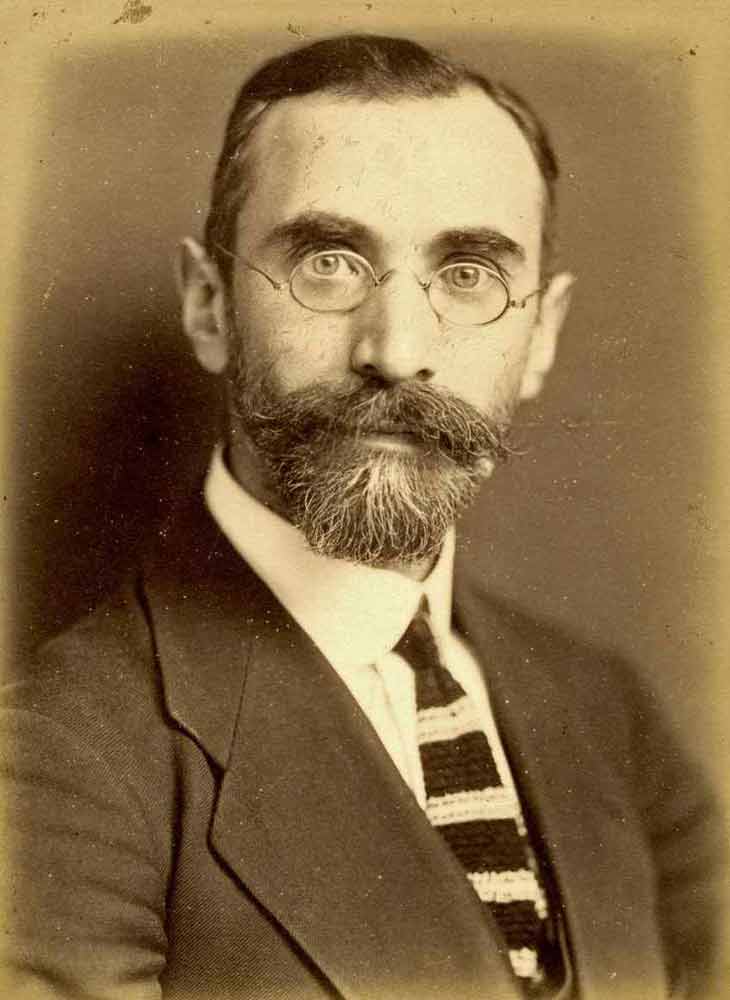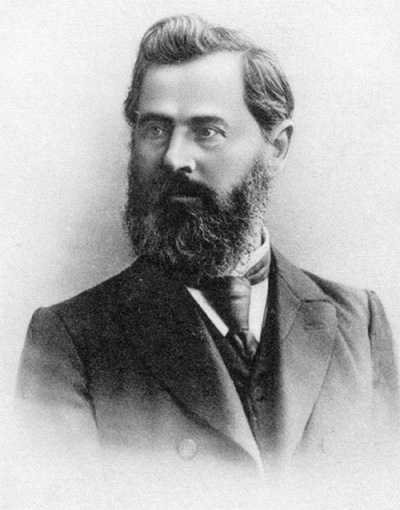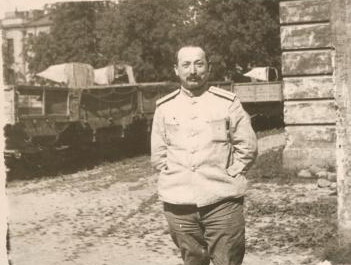<Back to Index>
- Leader of the Russian Social - Democratic Workers' Party Raphael Rein Abramovich, 1880
- Leader of the Russian Social - Democratic Workers' Party Pavel Borisovich Axelrod, 1850
- Leader of the Russian Social - Democratic Workers' Party Fyodor Ilyich Dan, 1871
PAGE SPONSOR

Raphael Rein Abramovich (July 21, 1880 - April 11, 1963) was a Russian socialist, a member of the General Jewish Workers' Union in Lithuania, Poland and Russia (Bund) and a leader of the Menshevik wing of the Russian Social - Democratic Workers' Party (RSDRP).
Raphael Abramovich was born in Riga in 1880; his real name was Adolf Rein. As a student at Riga Polytechnic he became involved in revolutionary politics and became a convinced Marxist. In 1901 he joined the Bund and the RSDRP. When the Bund withdrew from the RSDRP in 1903, Abramovich maintained contact with Menshevik leaders Martov and Dan. The Bund and the Mensheviks eventually patched up their differences, and Abramovich became a member of the Menshevik party. He edited the Social - Democratic journals Evreiskii Rabochii (Jewish Workers) and Nashe Slovo (Our Word). In 1905 Abramovich became a member of the Central Committee of the Bund. During the abortive Revolution of 1905, he represented the Bund in the St. Petersburg Soviet. In 1907 he ran unsuccessfully as a candidate for the second Duma. He attended the conferences of the Bund and the RSDRP in 1906 and 1907. In 1911 he narrowly escaped arrest and fled abroad, mostly living in Germany and France.
In 1914 he at first sided with the Internationalist wing of the Menshevik party, which opposed the First World War, but he was not as radically anti - war as Martov. After the February Revolution of 1917, Abramovich returned to Russia. He became a member of the Central Committee of the Petrograd Soviet. For awhile he became a qualified Revolutionary Defensist, siding with Mensheviks like Dan and Tsereteli against Martov. While Martov's Menshevik Internationalists opposed the war altogether, the Revolutionary Defensists supported a limited war effort in defense of the Revolution. However, they opposed territorial or financial war aims and rejected the unqualified pro-war stance of 'Social Patriots' like the aged Plekhanov and A.N. Potresov. After the October Revolution, Abramovich and Dan once more moved to the left and rejoined Martov's faction. Abramovich played a role in unsuccessful attempts to negotiate and all - socialist coalition with the Bolsheviks, comprising Bolsheviks, Mensheviks, Socialist - Revolutionaries of various factions and Popular Socialists. Neither Lenin nor most of the leaders of the other proposed coalition partners had any interest in this idea, though there was popular support for it among workers. The negotiations failed. Abramovich subsequently became more critical of the Bolsheviks. In 1918 he was arrested for anti-Soviet activities and escaped execution due to the intervention of Friedrich Adler and other foreign socialists.
In 1920 Abramovich left Soviet Russia. He settled in Berlin, where he co-founded and co-edited the Menshevik paper Sotsialisticheskii Vestnik (Socialist Courier). In the 1920s he was involved in organizing the Vienna based International Working Union of Socialist Parties, which united non-communist socialist parties that rejected the 'Social Patriot' leadership of the old Second International but refused to join the communist Third International. He was later included in the executive of the Labour and Socialist International. Abramovich was also instrumental in maintaining contact between Mensheviks abroad and their comrades in Russia. He helped mobilize Western socialist and labor support for socialists persecuted by the Soviet government, e.g. during the Trial of the Socialist - Revolutionaries in 1922 and the Menshevik Trial in 1931.
After the rise of Hitler, Abramovich moved to Paris. In 1940, when the Germans invaded France, he fled to the United States. He mainly lived in New York. He was a contributor to the Yiddish Social - Democratic paper Forwerts (Forward). Abramovich wrote his memoirs in Yiddish and an English language history of the Russian Revolution. He remained heavily involved in the activities of the Menshevik party in exile. In later years he opposed F.I. Dan's position that Soviet Russia, for all its flaws, was the country 'building socialism' and must be supported, and denounced Soviet totalitarianism. In 1949 he was one of the founders of the Union for the Liberation of the Peoples of Russia.
Raphael Abramovich was the father of the journalist Mark
Rein, who was kidnapped in Spain by the Soviet secret
service OGPU in 1937 and
subsequently murdered.

Pavel Borisovich Axelrod (Russian: Па́вел Бори́сович Аксельро́д; 25 August 1850 - 16 April 1928) was a Russian Menshevik.
Born Pinches Borutsch (Russian: Пи́нхус Бо́рух) in Potscheff near Chernigov and raised to Shklov, a small provincial town in (currently Belarus) and Mogilev, the biggest town of the three in the Russian Empire (currently Belarus), Axelrod was the son of a Jewish innkeeper.
In 1875 in Geneva, Axelrod married his former private student Nadezhda Ivanovna Kaminer. A student himself, Axelrod was Kaminer's and her sister 's tutor. Despite severe financial hardship during the first years, the marriage proved to be successful. They had three children: Vera (22.11.1875), Alexander (18.07.1879) and Sofia (14.11.1881). Nadezhda Ivanovna Axelrod - Kaminer died in 1906.
In the mid 1880s Axelrod established his own small
company producing kefir. By the end of the 1890s,
Axelrod's company had offices in Zurich, Geneva and Basel,
which provided steady income and allowed him to support
revolutionaries. In 1908, Axelrod sold his company in
exchange for the retirement payments to him from the new
owner.
Influenced by Mikhail Bakunin in his youth, he remained an Idealist even after adopting the Marxist philosophy of historical materialism. Axelrod co-founded the Marxist group Emancipation of Labor in Switzerland with his lifelong friend Georgi Plekhanov and Vera Zasulich in 1883. In 1900, Axelrod, Plekhanov and Zasulich joined forces with younger revolutionary Marxists Julius Martov, Vladimir Lenin and Alexander Potresov and the six edited Iskra, a Marxist newspaper, from 1900 to 1903. When Iskra supporters split at the Second Congress of the Russian Social Democratic Labor Party in 1903, Axelrod sided with the Menshevik faction against Vladimir Lenin's Bolsheviks.
In 1917, after the February Revolution Axelrod returned to Russia. By then some Mensheviks had already joined Kerensky's Provisional Government and supported government war policy. Despite all his efforts Axelrod failed to gain Mensheviks' support for a policy of immediate peace negotiations with the Central Powers. After the Bolshevik victory, which Axelrod called a "historical crime without parallel in modern history", he toured the world rallying socialist opposition to the Bolsheviks.
Axelrod died in exile in Berlin in 1928.

Fyodor Ilyich Dan (Russian: Фёдор Ильич Дан), often known in English as Fedor Dan, (October 19, 1871, Saint Petersburg - January 22, 1947, New York) was one of the founding leaders of Menshevism.
Fyodor Dan was born to a Jewish family in St. Petersburg. His original surname was Gurvitch.
Dan was a lifelong Communist activist. While still a young man he joined the Union of Struggle for the Emancipation of the Working Class. He was arrested in 1896 and exiled in Oryol for three years.
On his return he joined the Russian Social Democratic Labor Party and went to London for their Second Congress in 1903. Dan aligned himself with Julius Martov who wanted to have a larger party of activists, rather than Vladimir Lenin's conception of a smaller party of professional revolutionaries. Dan helped Martov form the Mensheviks, returning to Russia in 1912.
Living in St Petersburg, he edited Menshevik publications until facing exile to Minusinsk following the outbreak of World War I. He was released in 1915 when he agreed to serve in the Army as a surgeon. He returned to St Petersburg following the February Revolution and argued for Menshevik involvement in the Provisional Government. He also argued for continuing the war against Germany and Austria.
In 1917 he was the leading Menshevik on the presidium of the Petrograd Soviet. He opposed the October Revolution and he was a member of the small oppositional group in the Russian Constituent Assembly. However this was banned in 1918. Dan continued to denounce the curtailment of political freedoms, linking Bolshevism with Bakuninism.
Dan was arrested in 1921 and sent into exile. When the Soviet Union was attacked in 1941, Dan gave his support to the regime. In his book The Origins of Bolshevism (1943) he argued that Bolshevism was the carrier of socialism, whilst still arguing for political liberalization in the Soviet Union.
Dan died in New York City in the United States.